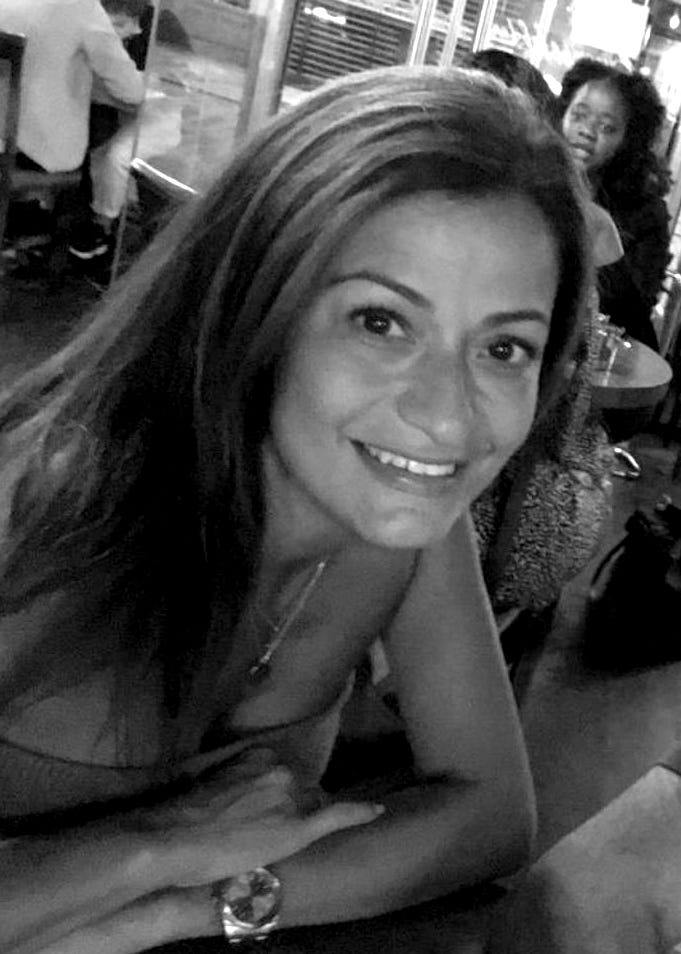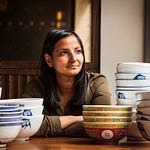In Episode 11, I talk with my 'hairy godmother,' Fanoulla Toulou about being the only survivor of a rare disease and how hospital food and faith saved her life. This episode comes with a recipe for moujendra, an old-school lentil and rice Cypriot classic that both Fanoulla and I were so mortified of when it turned up in our pack lunches as children from immigrant households - but have both now rediscovered and adore!
Episode 11 Transcript: Fanoulla Toulou interviewed by Julia Georgallis
Hello, welcome to the How to eat alone podcast, with me, Julia Georgallis. I’m a baker and I write about food. This is a podcast that looks at the art of eating alone and explores topics surrounding loneliness and aloneness which are not necessarily the same thing. I’ve been talking to people from all walks of life about their experiences of solitude and solo dining. With each episode, I’ve shared a recipe designed to be cooked and eaten by one person and one person only, because most recipes are very often written for two or more people.
Since I started this podcast I’ve been really trying to frame aloneness as something good, something that can be really positive. It really can be! There are many, many good things about doing things on your own. But sometimes, let’s face it, it’s a bit shit. And it’s never as shit as when you’re not feeling very well and find yourself on your own. Because, when we’re sick, we, you know as a matter of survival, must seek out others to look after us - We can ask for help from family or friends or neighbours or carers or we can go to the doctor. But it’s also really important to seek out emotional support or to reach out to people who might be suffering with the same thing as you to make us feel less like we’re carrying a burden on our own and that we’re not the odd one out, you know the only person with a certain type of illness or certain type of disease. I personally have a chronic condition which is a type of arthritis and I’ve recently joined support groups and have found lots of comfort in knowing that, even though I’m dealing with this condition on my own, there are lots of other people out there dealing with the same thing. It puts it all into perspective for me. But, you know, what happens when you can’t reach out to other sufferers? That was the case for my ex-hairdresser, Fanoulla Toulou. I’ve known her for a while, she’s her late forties, she’s worked as a hairdresser since she was in her teens. She’s one of my neighbours here in North London, she’s Greek Cypriot like me and I started getting my hair done with Fanoulla when I was about 14 and though she doesn’t work as a hairdresser anymore she’s still very much my hairy godmother. I have confided in her things I don’t really tell anyone else, it’s probably the hairdresser’s effect, when you’re sat in a hairdresser’s chair you just talk about things you might not tell anyone else. But a few years ago Fanoulla had to stop cutting hair because after she was diagnosed with a rare condition - that she nearly died from. In fact, she is one of the only known people to survive the final stages of her debilitating disease. Since then she’s made recoveries and relapsed, then recovered and relapsed again. But she’s still alive and she’s not only just surviving her illness, she’s thriving with it. And, I’ve never actually talked to her about what it’s like to be the only person with a condition of medical interest and I guess was curious to know what it felt like to be the only survivor or one of the only survivors of a rare condition and how she has managed to overcome all the challenges that it throws at her.
JG - Hi Fanoulla - thanks for being on my podcast. Can you maybe start by telling me a little bit about your story and about your condition and your diagnosis - what is it? How did you come to find out you had it?
FT - I had this annoying cough it just would not go - misdiagnosed for years as poorly controlled asthma. I knew it was more - I don’t smoke. Rarely drink. Something just wasn’t right. I just felt so unwell to the point where the world just started to go dark. One night it just culminated into so much pain, unable to breath and then I collapsed - went to hospital and they diagnosed that I’d had a heart attack but I didn’t have the symptoms of a heart attack - they were really confused and then that kind of started the whole trying to diagnose me because there were so many things wrong. Everything they were giving me just wasn't working. The cough, it wasn’t asthma, I wasn’t responding to anything. Finally, doctor came in, found out that some of my eosinophil levels were dangerously, crazily high, which they, again, never really seen. And eosinophils are what are elevated when you have allergic reactions whether to foods, atmosphere, pets, anything like that. So, my own body was attacking itself and the heart was filling with water to try and protect itself but, to the point where it was killing me really.
JG - What is your condition called?
FT - It’s called Churg Strauss syndrome, they’ve now renamed it Eosinophilic Granulamatosis with Poly Angina and it’s a form of Vasculitis but this is where again the eosinophil levels are really really elevated so you have extreme reactions to things.
JG - How long from the heart attack did they diagnose you with this?
FT - 2 weeks.
JG - What do they know about your condition?
FT - They don't know loads about the condition. They just know it’s a form of Vasculitis, and vasculitis is inflammation of the nervous system. But they know that with Cherg Strass it can affect the lungs, the veins, the heart, which is the last stage, which is the stage that I got to.
JG - And you survived that.
FT - Yeah. They usually find that someone’s had Cherg Strauss and got to the last stage from the autopsy.
JG - I mean you are a bit of a lab rat, right, they’ve done lots of studies of you because of that.
FT - They’ve done loads. They’ve done so many tests.
JG - Because you’re one of the only ones.
FT - Yes
JG - That’s crazy. So how does that feel?
FT - Well when you say it to people they’re like wow. But actually, it’s not wow for me. Because it’s really isolating. Because I can’t talk to anyone about it. And also you feel like a lab rat. That it’s trial and error. I like to confront them about most things because they’re learning as much as I am. They say to me it’s incurable and I kind of argue back with ‘well that’s because you’ve not found a cure.’ I suppose it’s just through testing that they’re learning. So that’s scary for me. Cos’ there isn’t loads of research, there’s not much out there.
JG - Do you ever read the research that’s done about you?
FT - I read the research that was done about me. And it was the most scariest thing I’ve ever read but also the most uplifting because when I finished reading the report that the heart consultant did I thought, wow, I’m still here after reading all of this, it was amazing. I read it and I thought *gasps* ‘wow this girl’s sick…’ and I thought, oops, it’s me!
(They laugh)
JG - Oh my gosh, I’m glad you’re still here Fanoulla.
FT - Me too. Because they made it so clear from the start that it was very rare, when I was in hospital, people were, doctors were constantly coming in and out asking the same questions, doing different tests, I was so fearful because, like I said before, these people don’t know what they’re looking for. I thought they were fantastic but there was no trust. It was those moments when I was alone when the doctor’s shift had finished that I’d sit there and think ‘what have they found today? Am I gonna go home?’
JG - And you’re married, you have Andy, was he around?
FT - He didn’t leave the hospital. I was in isolation because they were worried about me catching any infections so I was isolated in a room - Andy didn’t want to leave and I didn’t want him to leave either. Because it was a bit touch and go. There was talk that I probably am not going to go home, I was that unwell. So he didn’t want to leave me. He was my main concern. I didn’t want him on his own.
JG - I guess for both of you that must have been really really really tough
FT - More for him really because he was looking on.
JG - It’s worse. It’s better when you’re in it because you know what you can deal with but the other person doesn’t really know what you’re dealing with. It’s quite lonely for him as well. So that was in 2016. And since 2016, I mean, you’ve made a pretty spectacular recovery really.
FT -Miraculous. It really is a miraculous recovery.
JG - How have you got yourself through that?
FT - My faith. My faith is important to me and it’s what’s real to me and that’s the only way I’ve got through it.
JG - I don’t remember you having faith before this.
FT - I had faith but it wasn’t alive, let’s say. It was something that I was brought up with culturally through my Greek Orthodox background but there was no relationship.
JG - I’m not a Christian but I see how that really has helped you like has just healed you.
FT - Completely. And I say that to people and I say that to the Doctors and people look at me like…
JG - Do people roll their eyes at you quite a lot?
FT - They roll their eyes at me!
JG - I can imagine
FT - And it’s funny, you can say anything about anything else but once you mention Jesus it’s like… *GASPS*… I’m alive when I shouldn’t be. And that for me is proof enough. Because I put my faith in him when I was distrusting of everything else. I’ve gone with that and it’s worked!
JG - Well it clearly has worked. Do you think having faith also ostracizes you a little bit?
FT - Completely. People stop listening. Which is actually fine. It’s weird, you never would think that something so kind and full of love would ostracize me so much because I’m not saying anything to offend anyone.
JG - The reason there’s so much offense is because I think a lot of religions have been offensive but I don’t think your way of believing things is offensive. Do you go to church?
FT - Yeah I go to church, but I read the bible, so I go straight to the source
JG - And you’re also studying biblical counseling
FT - Yes. It’s counseling but bible based.
JG - Right. As it sounds (they laugh) Does what it says on the tin. So how has your treatment changed you, do you think, as a person?
FT - I don’t like the dependency associated with medication - the ‘oh if I stop that it’s all gonna go wrong again.’ It’s been a really long process for me to be in control of the medication, not the other way around.
JG - It’s not just the medication though it’s for the condition to be in control of you
FT - Yeah. And it’s not. I’ve never owned the condition. I wasn’t born with it so I don’t own it. You know I hear friends and clients, they own their condition like, ‘oh my this, oh my arthritis…’ no no no no. You’ve acquired it, you’ve got it but don’t own it. So I’ve never owned the Cherg Strauss, it’s something that happened but it’s not me.
JG - And that’s really important actually for me to hear and probably for a lot of people who have a chronic condition.
FT - I believe that if I really owned it and I kind of submitted to that condition more than to my faith I don’t know where I would be.
JG - Medicine is great! That and your faith has saved your life…
FT - It all works together!
JG - I know you are a foodie and I know your diet has changed quite a lot because you have told me that you have changed your eating patterns since your illness.
FT - Yeah, because the condition is inflammatory so I needed to go on an anti inflammatory diet and coming from Cyprus, I’ve got that Mediterranean diet running through my veins but you kind of rebel against it. I was the only Greek in my year!
JG - Yeah so you were bringing in weird food for pack lunch and everyone was taking the piss out of you.
FT - Everyone was getting sandwiches, I open my lunchbox and it smells of garlic
JG - You’re like I DON’T WANT DOLMADES I WANT A CHEESE SANDWICH.
I WANT CHICKEN NUGGETS I DON’T WANT KLEFTIKO!
FT - I remember going on a school journey and I opened my flask and there was rose cordial in it - and everyone was like errrr you’re drinking perfume.
JG - That’s delicious!
FT - It was ‘triantafilo’ it was rose cordial, with loads of ice cubes and a bit of lemonade to make it fizzy
JG - ooo, that’s really nice. But you have gone back to that original diet, I suppose.
FT - I try to not have sugar, which is hard. It’s learning that control, of you being in control of your body not the other way around. Those, you know, those treats! They’re so many lovely treats everywhere, because it’s part of our culture - no one can come round and you don’t get the cakes out and you don’t get the treats out.
JG - What is an anti inflammatory diet?
FT - Sugar is inflammatory, dairy is inflammatory and so is gluten. So I’m not on a sugar, dairy or gluten free diet but when those things are together, it’s quite explosive!
JG -
Alright, I do need to offer a disclaimer about the anti inflammatory diet. As are most diets, it’s kind of contentious and there is very little research that has been conducted about whether it actually works. In fact, though even though it has been suggested to a lot of different sufferers of different conditions - from arthritis to multiple sclerosis, it’s kind of difficult to pin point what constitutes as an inflammatory food. So as Fanoulla says, sugar is widely associated with inflammation and so is dairy but gluten is debatable, some anti inflammatory diets extend to red meat, alcohol, even to things like like tomatoes, peppers and aubergines - I dunno what an aubergines ever did to anyone to inflame the situation is completely beyond me, but anyway, the anti inflammatory diet seems to work for Fanoulla but just bare in mind that with diets, what works for one person may not work for someone else.
JG - So are you saying, Fanoulla, no cakes? (They laugh)
FT - I mean I’m saying have cake but just… now and again. I don’t think you should eliminate anything unless, obviously you can’t, but I just try not to over indulge.
JG - That’s pretty straight forward. For some reason I thought you were on a very strict diet. But that sounds perfectly reasonable.
FT - I call it like the common sense diet. I’ve tried to go back to the diet that my mum and dad used to feed me that I kind of rebelled against, I’m now going back to and I’m loving everything that they used to cook. The pulses, the fish, the salads…
JG - Oh god the pulses…
FT - Yeah. It was a three times a week thing at my house and when I’d open the door, coming from school I’d think ‘oh no… we’ve got beans.’ We’ve got lentils, you know those smells don’t you, you just know.
JG - No more moujendra! But to be honest with you now moujendra is one of the things I eat so much - It’s so easy.
Moujendra, for anyone who isn’t Greek Cypriot, is a dish that I also couldn’t stand as a kid from an immigrant family growing up. I would have much rather had chicken and chips for my dinner but my mum gave me rice, lentils and yoghurt instead. So moujendra is a dish that extends from Greece throughout the Middle East - you might hear it called Fakes Moutzentra in Greece, Moujendra in Cyprus and Moujadarra in the Arab world (I hope I said that right I don’t speak Arabic) It’s very simply lentils, rice and sauteed onions, often served with a dollop of Greek Yoghurt. And even though I didn’t like it as a kid, now I love it. I eat it all the time, it’s the Arab equivalent of rice and peas, and these days I make it fancy these days - I use red onions, different colour lentils, wild rice, I like to add spice like cumin and cinnamon - sometimes it’s delicious with a dollop of tzatziki rather than greek yoghurt - it’s so quick, so easy, really good for you, I can’t love it enough.
FT - You can pimp any pulse
JG - Yeah pimp my pulse
(They laugh)
FT - And what’s nice about pulses is that they’re equally as nice cold as they are hot so they’re such great on the go food.
JG - But so many people have problems with pulses and I hear it all the time but I was actually reading that the reason that that happens is because you’re not eating enough beans just because our systems are so blocked up that you need to keep eating… those beans
FT - Incorporate them into your diet, once a week at least.
JG - Keep going!
(They laugh)
Once you start you can’t stop! Also what’s the problem with farting all the time! There’s no problem!
FT - Better out than in!
JG - Better out than in! Eat the beans! Exactly! So - hospital food! What did you eat when you were in hospital?
FT - That was my adventure every day - I loved it!
JG - Really? Are you joking?
FT - No. I loved it.
JG - Where were you in hospital?
FT - I was at the Royal Free, it wasn’t a private wing of the Mount Sinai, no, but I really… Julia, I was grateful to be alive. Anything they gave me - I blessed that food, I ate it and I was so happy.
JG - You’re such a good human.
FT - I just think, you know what, I was so grateful. It was very school dinner-y. And it was everything that’s not healthy.
JG - This is the thing about hospital food, is that, people complain about it because it’s not nutritious but if you are on your deathbed, you need some sugar and some carbs you need to be kept alive and those things keep you alive.
FT - I think it did the trick because when you’re not well you don’t really want to have beans and salads and things like that, I really didn’t want it, so I loved the chicken casseroles and the rice and crispy potatoes.
JG - It’s comfort food
FT - And sponge and custard. Every day I had sponge and custard. It’s comfort food, it’s rib sticking food. And I’d lost so much weight that it really started to build me up. You can’t beat a bit of dinner lady food. I thought it was fun so I went with it.
JG - And what about now? What do you cook for yourself on your own, I mean I know you have Andy - what do you like to eat when you’re on your own?
FT - I make eating on my own a real celebration. It goes back to my faith, because He says I’m fearfully and wonderfully made so I’m like, I’m worthy of a nice meal because usually we cook for everyone else and we want to make everything special for everyone whether it’s for Andy or the family or friends and then when you sit on your own you think ‘ahh I’ll just have a sandwich and a bag of crisps and I’m like no, I want to cook what I want to eat! I actually go out of my way to cook something nice for when it’s just me.
JG - Is it just you often?
FT - Yeah. Mostly me and Andy, we’ll always eat together, on a Thursday he’ll pop out with his friends and have something to eat and Thursday night I will always make something for me - Thursday night is my cooking night for myself.
JG - It’s really important to have your alone time when you are in a relationship as well.
FT - Yeah! It’s so, so important. He likes that equally as much as I do. If I pop out and he’s on his own, he’ll probably just grab a takeaway.
JG - Solo takeaways are the best. I just love getting a takeaway by myself. And do you know what, I actually order takeaways like I’m two people because I like having another meal the next day. I think I started ordering for two because I was a bit like ‘oh I don’t want them to think I’m on my own’ so, for whoever it is, whoever’s preparing my meal I’m like ‘oh I need them to think there’s at least two of me.’ But then it just became like ‘oh I don’t care about that!’ I just want all the food!
FT - Yeah I remember the first time I went into a restaurant to eat by myself I must have passed the restaurant four, five times before I went in. I didn’t actually tell my parents that I went into a restaurant on my own. Because they would have been ‘what there was NO ONE to go with you?’ It’s like, no it’s not about no one going with me I actually wanted to go on my own. I was hungry! Can I not just be hungry? I mean it’s funny because when you go out for dinner as a couple or with friends I usually base what someone else is eating to what I’m going to choose. So when you go on your own, you just choose what you want. And also when you eat on your own you I think can control the amount you’re eating, you usually always eat more when you’re with others. It’s a little bit more disciplined I think… well you have two takeaways…
JG - Errrr… I’m pulling a face at the moment.
FT - You are! This might not apply to you.
JG - I think it doesn’t apply to me
FT - But for me, when you’re eating on your own, it’s just cooking for one, not the Greek thing like for 10.
JG - Yeah and that’s the thing that I think I struggle with and why I started this podcast in the first place was because I was cooking for myself and just making way too much food.
FT - Be in control!
JG - Be in control of your body!
FT - Tummy and mouth
JG - Tummy AND mouth
They laugh
JG -
Tummy and mouth living happily ever after. Thankyou so much to Fanoulla for telling me about her experiences with Churg Strauss and for sharing how the doctors and medicine kept her going on a physical level and definitely keep her symptoms under control, but it seems like faith and food really kept her going emotionally and on a spiritual level.. I’m not religious, I’ll be honest I don’t really like or trust organised religions and I was kind of unsure about getting onto the topics of Christinaity with Fanoulla. But I do genuinely believe that without her faith, she just wouldn’t be here today and I wouldn’t have my friend with me today. You can call it God or you can call it the power of the human spirit or placebo, but I think I would call it a presence that guided Fanoulla so that she didn’t feel so alone. And I think that’s what religion is, it can kind of act as a direct salve to loneliness sometimes.
I also just wanted to touch on my own personal salve to loneliness. So as I mentioned in the podcast, I order enough takeaway for two people whenever I order a takeaway and I started doing this because initially I felt embarrassed to acknowledge that I was ordering food alone, which is ridiculous, why was I embarassed about that? But now become a solo dining hack. Because takeaway is expensive, it’s way more expensive if you’re single and generally speaking takeaway portion sizes are for more than one person and I love leftovers and it made more sense to me, if I’m already paying for delivery, to order more food, because, well it’s economies of scale really! So I usually try and get three meals out of any takeaway order. But obviously you also need to exercise some self disclipline because I have absolutely been the girl who ate two takeaways in one night. But anyway, that’s my hack and I’m proud of it and I definitely recommend ordering two takeaways for yourself (if you can afford it!)
I’m leaving you with a recipe for moujendra, that old school lentil and rice Cypriot classic that both Fanoulla and I were so mortified of when it turned up in our pack lunches as children. You can find this recipe and all of the other recipes from the podcast at howtoeatalone.substack.com - you can subscribe to the substack page to receive more recipes and news about my podcast and you can also find out more on the instagram page, just head to the handle @howtoeatalonepodcast. As always I hope you’ve enjoyed being alone with me for this episode - if you like this podcast, please share it with others who you think might like it too or give it a good rating wherever you get your podcasts from. I’ll see you next time for the next episode of ‘How to eat alone…’
Find out more about 'How To Eat Alone' here.
Find out more about podcast host, Julia Georgallis here.
Music
Ben Beiny
What's Cooking
https://www.premiumbeat.com













Share this post